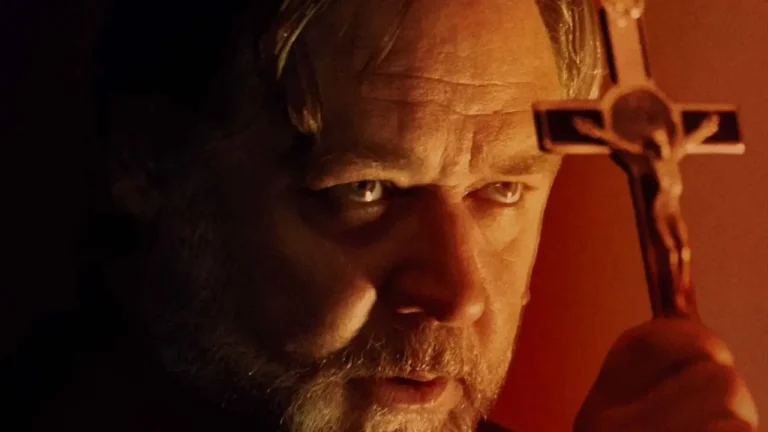Gerald’s Game (2017): To what level can you torture yourself for survival? Pause for a second to imagine whether you wish for a soft, calm death or survival that will spill out all your repressed horrifying memories to such a harrowing level that death may seem an easy option. Picture the most insufferable fear of your life, and then begin to watch Gerald’s Game.
This 2017 movie released on Netflix starts as a woman’s survival horror story but steadily dives into a deeper psychological level. The story is adapted from Stephen King’s novel of the same name. Gerald’s Game – an impregnable and unfilmable book that was considered impossible as a movie because three-fourths of the book transpires inside the protagonist’s mind, and where the audience will see only one scene on the screen for the majority of the time. A scene where a woman is handcuffed to the bed. But here is where brilliant directors come in. The director, Mike Flanagan,’s faithfulness and passion for the book is seen through his superb direction.
Gerald’s Game is not that typical jump-scare stereotype horror film, but it will shake your psyche and give you some sleepless nights.
Memory is the basis of every journey. Memory is identity. It’s you,’ quoted Stephen King.
Jessie, the protagonist powerfully played by Carla Gugino, when handcuffed, has to slice out layers and layers of her meek, dutiful, silenced mind and reach the submerged, shameful, voiceless memories to defeat death. Deep beneath Jessie’s made-up layers, the memories of the predator still lurk inside her murky mind.
The story begins when a couple, Jessie and Gerald, go for a vacation to a secluded lake house to spice up their marriage. Much older than Jessie, Gerald gulps down a Viagra tablet and starts a kinky game by handcuffing Jessie, which she utterly detests. Despite her request to uncuff her, Gerald goes on with his fantasy and accidentally dies of a heart attack, leaving a handcuffed Jessie alone in an isolated house. The terror, which seems like a situational horror, slowly escalates to a different level. With nobody to help her, Jessie must devise an escape plan and face some gory visitors. Since the door is ajar, a rabid dog hungry for fresh flesh and a creepy, incoherent phantom called the ‘Moonlight Man’ enter the bedroom to give Jessie company.
This gruesome trauma makes Jessie hallucinate, and her mind gives birth to her alter ego (Jessie 2) and her husband’s ghost (Ghost Gerald). Throughout the film, Jessie 2 persuades Jessie to fight for survival, while Ghost Gerald is a narcissist who gaslights Jessie to make her believe that Moonlight Man is the face of her death and that death is inevitable for her.
It’s for Jessie to decide whose voice she should listen- Jessie 2 or Ghost Gerald. However, Jessie is terrified, dehydrated, cramped, and baffled by everybody’s existence. She cannot resolve who is real and who isn’t. And here is where the movie begins gripping the audience, trying to convey a weighty message through its symbolism. Symbolism is a creative instrument to dramatize and nurture difficult, disturbing themes in a movie. It arouses the audience’s imagination to understand the meaning hidden inside such motifs.
The situation of Jessie being handcuffed is an extended metaphor for her imprisonment. Her bad memories enslave her mind. The layer of Jessie’s dark memories surfaces when Ghost Gerald calls her a ‘mouse’ who the Moonlight Man will kill. The word ‘mouse’ exasperates Jessie. Further, Jessie 2 reminds her that ‘He’ called her a mouse.
“He’s put you in those handcuffs way before Gerald did,’ says Jessie 2.
The story flashes back to the solar eclipse day when Jessie was twelve-year-old. Now, this is going to make your blood run cold. ‘He’ Jessie’s father does something nasty while she watches the eclipse. However, the scariest scene is when he manipulates little Jessie to keep her mouth shut. Her daddy’s shocking gaslighting dialogue becomes the haunt of Jessie’s life. The ambiance of disgusting horror suddenly clasps us as we see the melancholic misery in little Jessie’s eyes. One will pause for a second to sink into the deadly existence of this human monster. It’s the darkest topic to depict in cinema, where the child’s guardian protector becomes the child’s predatory monster.
Alia Bhatt’s movie ‘Highway’ deals with this delicate topic maturely, where, in the end, Alia speaks her heart out in front of her wrongdoers. In Gerald’s Game, Jessie has suppressed the evil act and silenced her mind. Jessie’s victimization is subdued and runs with the analogy of a solar eclipse. And that’s what is chilling and phenomenal!
A solar eclipse superstitiously relates to the act of evil. Many notional beliefs consider solar eclipses inauspicious because the sun, the living energy, gets covered with a dusky moon, painting the sky reddish dark. It’s when our life-giver, our creator, gets into that temporary period of red darkness and loses touch with sanity. When the life-giving sun energy gets eaten by the dark energy, it’s the death of everything. There’s nothing more painful than that.

The anguishing terror Jessie suffers from the day of the eclipse overpowers the body horror scenes of the rabid dog tearing away Gerald’s flesh. Later, in one scene, when a grown-up Jessie meets her younger self, little Jessie says,
‘My job was to be a kid. But that wasn’t an option anymore after the eclipse.’
Also, little Jessie tells the grown-up to remember something she already had for survival from the beginning. This sentence hits Jessie’s mind like an epiphany. She remembers something.
‘The thing about blood is that until it clots, it’s as slick as oil.’
Jessie degloves by shedding her hand’s skin with the shards of broken glass. Her peeling act and making blood as a lubricant to slip away from the handcuffs will give the viewers heebie-jeebies. However, one can feel Jessie’s emotional liberation from her dreadful past as she makes room for new skin to grow by shedding away her distressed skin, the same metaphor relevant to snakes shedding their skin. It’s a moment of Jessie’s resurrection.
After uncuffing herself, Jessie steps over Gerald’s corpse and says –
‘Her days of doing things because her man told her to do, are over.’
Before rushing toward her car, Jessie tosses her wedding ring inside the Moonlight Man’s bag of bones. This signifies that Jessie is no longer a ‘problem, panic, and denial.’
This diabolical creature, Jessie calls the Moonlight Man, is the dark moon covering the sun during the solar eclipse. He is the underlying fear of Jessie. He is death, dark memories, hideous secrets, and nauseating incidents. The pictorial visual of Jessie giving away the wedding ring is her liberation from male chauvinism and manipulation. Nonetheless, it’s the sentence that Jessie says to the Moonlight Man that triumphs her as a winner.
‘You are so much smaller than I remember,’ quotes Jessie.
The idiom says it all.
Undoubtedly, Stephen King is a spiritual writer. He has a beautiful way of expressing adult irrationality germinating from childhood frustrations. Beneath the dark blankets of his gory stories, there is ALWAYS a hopeful shine—a hope to defeat our repressing flashbulb memories and gift the future our rediscovered self.
Gerald’s Game is about a woman’s suppression, how she faces her deep-rooted wounds, courageously confronts her fears, visualizes that she will survive, and bounces back to life with her renewed feminism. And though the movie entirely runs from a feminine perspective, for me, the film goes beyond gender.
In some way or another, every human being will link to Jessie’s handcuffs. This is because everybody is handcuffed to their internal fears. Outwardly, we never wish to vomit our fears out; still, yes, this ‘still’ is a funny word; it negates whatever is said before it. So still, we are so hungry to uncuff the horrifying fear of our lives.
‘If fear cannot be articulated, it cannot be conquered,’ quotes Stephen King.
Through its gruesomely fantastic story, Gerald’s Game (2017) inspires us to articulate and vocalize our shameful fears. It tells us, dear audiences, it’s time to orate your stifling choked-up fears. Don’t let fear become the thick mucus of your throat. Don’t swallow your fears but spit them out bravely. Conquer your fear, control your memories, and master your life. When Jessie breaks the shackles of her chained fears named silence (her father’s) and comfort (her husband’s), she discovers her true self.
Whatever your fears, readers, it’s time to tell your Moonlight Man-
‘You are so much smaller than I remember.’

![Hostages [2017] – Tense and Tragic Drama Set Behind the Iron Curtain](https://79468c92.delivery.rocketcdn.me/wp-content/uploads/2017/12/cover-768x432.jpg)
![Lion [2016] – A Melodrama with Considerable Stretches of Admirable Nuance](https://79468c92.delivery.rocketcdn.me/wp-content/uploads/2017/02/lion-cover-768x512.jpg)



